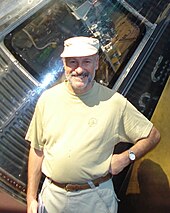Julio Ángel Fernández
Julio Ángel Fernández | |
|---|---|
 Julio Ángel Fernández in 2008. | |
| Born | Julio Ángel Fernández Alves 5 April 1946 |
| Nationality | Uruguayan |
| Alma mater | Universidad de la República |
| Occupation(s) | astronomer, teacher |
Julio Ángel Fernández Alves (born 5 April 1946)[1] is a Uruguayan astronomer and teacher, member of the department of astronomy at the Universidad de la República in Montevideo.[2] He is also a member of PEDECIBA, (the program for development of basic sciences in Uruguay),[3] and the Uruguayan Society of Astronomy.[4] From 2005 to 2010, he was the Dean of the Universidad de la Republica's Faculty of Sciences.[5] The asteroid 5996 Julioangel, discovered in 1983, was named after him.[6]
He is an active researcher of the Researchers National System of Uruguay.[7]
Fernandez is member of the National Academy of Sciences of the United States.[8][9][10]
Kuiper belt[edit]
In 1980, in his paper On the existence of a comet belt beyond Neptune, Fernández proposed that periodic comets arrived too frequently into the inner Solar System to be accounted for solely by having arrived from the Oort cloud, and that a trans-Neptunian belt of comets at around 50 AU would be required to explain them.[11] Subsequent computer models by Martin Duncan, Tom Quinn and Scott Tremaine in Canada supported the view, and led eventually to the discovery of the Kuiper belt.[12] David Jewitt, who discovered the belt, believes that Fernández deserves more credit than anyone else, including Gerard Kuiper, for predicting its existence.[13] He has subsequently published many papers on the trans-Neptunian population.[14]
Definition of planet[edit]
In 2006, Fernández was one of a number of dissenters at the IAU's meeting to establish the first definition of "planet." As an alternative to the IAU's draft proposal, which had included Pluto, its moon Charon and Ceres among the planets, Fernández with his Uruguayan colleague Gonzalo Tancredi proposed a definition where they reserved the term "planet" only for those objects in the Solar System which had cleared their neighbourhoods of planetesimals, describing those objects which had not cleared their orbits yet retained a spherical shape as "planetoids."[15] The IAU's final definition incorporated much of Fernández and Tancredi's proposal, though the objects were christened "dwarf planets."[16] The event originated the word "Plutoed," which was selected as the "word of the year 2006" by the American Dialect Society.[17]
Books[edit]
- Fernández, Julio Ángel (30 March 2006). Comets: Nature, Dynamics, Origin, and their Cosmogonical Relevance. Springer. ISBN 978-1-4020-3495-4; e-book
{{cite book}}: CS1 maint: postscript (link) Fernandez, Julio A. (2005). 1st edition. ISBN 978-1-4020-3490-9; hbk{{cite book}}: CS1 maint: postscript (link)[18] - Lazzaro, Daniela; Ferraz-Mello, Sylvio; Fernández, Julio Ángel, eds. (27 April 2006). Asteroids, Comets, and Meteors (IAU S229). Cambridge University Press. ISBN 9780521852005.
References[edit]
- ^ Professional CV
- ^ "Departamento de Astronomía, Instituto de Física, Facultad de Ciencias, Universidad de la República".
- ^ "PEDECIBA Física". Archived from the original on 19 April 2016. Retrieved 7 May 2016.
- ^ "Sociedad Uruguaya de Astronomía".
- ^ Heber Rizzo Baladán (2006). "Los mundos helados de Julio A. Fernández". Archived from the original on 25 July 2011. Retrieved 7 November 2009.
- ^ "Julioangel asteroid. Minor Planet Center. The International Astronomical Union".
- ^ "Sistema Nacional de Investigadores (Uruguay)". Archived from the original on 10 April 2016.
- ^ "News from the National Academy of Sciences".
- ^ "Astrónomo uruguayo ingresa a la Academia Nacional de Ciencias de EEUU. En Perspectiva".
- ^ "Histórico, astrónomo uruguayo será Miembro de la Academia de Ciencias de EE.UU. Diario La República".
- ^ JA Fernandez (1980). "On the existence of a comet belt beyond Neptune". Observatorio Astronomico Nacional, Madrid. 192 (3): 481–491. Bibcode:1980MNRAS.192..481F. doi:10.1093/mnras/192.3.481.
- ^ M. Duncan; T. Quinn; S. Tremaine (1988). "The origin of short-period comets". The Astrophysical Journal. 328: L69. Bibcode:1988ApJ...328L..69D. doi:10.1086/185162.
- ^ David Jewitt. "WHY "KUIPER" BELT?". University of Hawaii. Retrieved 14 June 2007.
- ^ Julio Fernandez. "Página personal del Dr. Julio A. Fernández". Universidad de la República. Archived from the original on 8 March 2008. Retrieved 8 February 2008.
- ^ Britt, Robert Roy (18 August 2006). "Pluto May Get Demoted After All". Space.com. Retrieved 24 August 2006.
- ^ "IAU 2006 General Assembly: Resolutions 5 and 6". IAU. 24 August 2006.[permanent dead link]
- ^ "Plutoed Voted 2006 Word of the Year". ADS. 5 January 2007.
- ^ Brandt, John C. "Review of Comets Comets: Nature, Dynamics, Origin, and Their Cosmogonical Relevance by Julio Ángel Fernández". Physics Today. 59 (9): 60. doi:10.1063/1.2372432.
